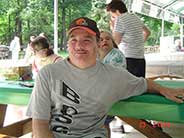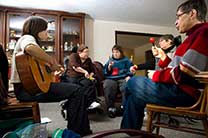Imagine moving into a home with complete strangers. You may have had a similar experience with a college roommate. How long did it take to get used to your roommate’s habits?
Now imagine facing this challenge if you are a person with intellectual disabilities. This is what your child may encounter, but not only will he or she have to adjust to roommates, but to providers as well. These adjustments might also challenge you.
Help your child prepare for life outside of your home early.
Focus on Benefits—Strengthening Family Relationships
One way to prepare for life with housemates and support staff is for you and your child to stay focused on the benefits of living independently. One great advantage, parents say, to having children move into their own homes is building a stronger relationship.
Too often, when a person with intellectual disabilities lives at home, the parents or other family members are caregivers. This is natural, but can hinder developing a normal parent-child relationship. Boundaries between being a support provider and family member blur.
Many families report that, after a professional service provider becomes the main caregiver, they realize how much they had been missing.
Finding a home for your adult child will also help you balance protecting your child and allowing him or her to be independent. This requires significant compromises and can be difficult, but parents report that they worry less about the future and develop a healthier relationship with their children.
Make Planning a Family Project
After they had made a decision about where Steve would live, his mother announced her son’s plans to the rest of the family. Steve’s grandmother could not believe that her grandson would want to move into a group home and accused her daughter of discarding him.It took many months before the grandmother could be convinced that her grandson had chosen to move and that his mother was only supporting him in his decision.
Planning for the future should be a family project that includes everyone who will continue a relationship with your child.
Your child must be included in all decisions and discussions. He or she must decide how much involvement he or she wants from family members. Just like other aspects of planning, get family members and advocates involved early. This involvement will allow future advocates to develop a relationship with your child and will ease the transition to their role as primary advocate or guardian.
Some children, for example, find it demeaning when support staff exclude them when discussing issues with their parents. In this situation, make it clear that the staff needs to communicate directly with your child.
Ways Family Can Be Involved:
- Help staff get to know and appreciate your child
- Be an extra set of eyes and ears in monitoring for safety and quality
- Assist your child to make good decisions
- Serve as a mentor and bridge builder with the community
- Encourage other family members to support the plan in order to foster more independence for your child













